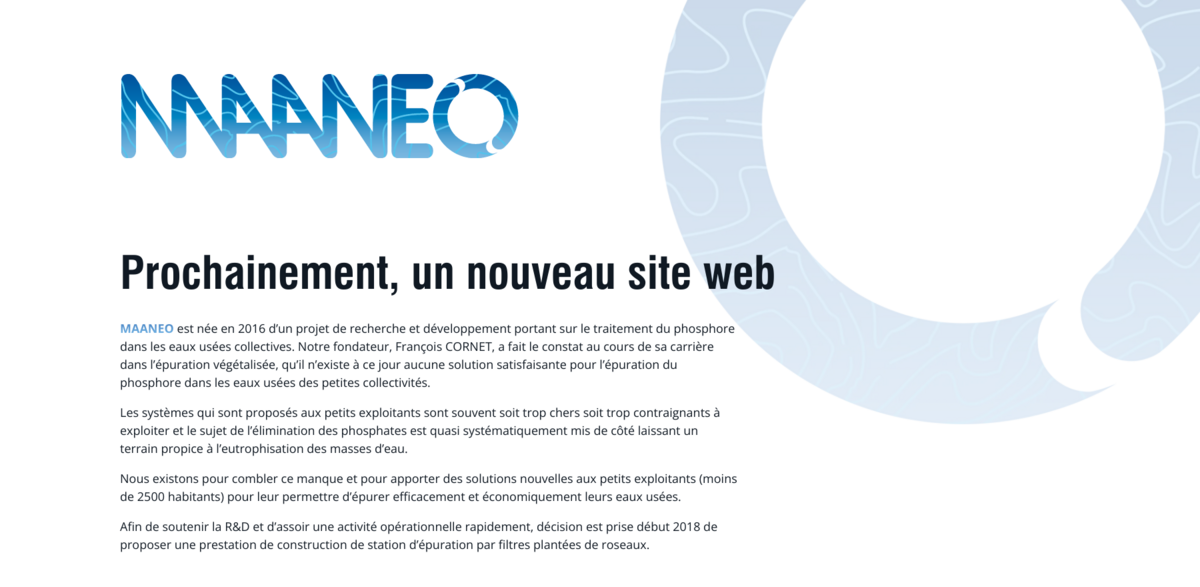What the Project Is
MAANEO was born in 2016 from a research and development project focused on phosphorus treatment in collective wastewater. The origin of this initiative lies in a clear gap identified in the treatment of wastewater for small communities. Over time, it has evolved by staying true to the objective of introducing an innovative process to remove and recycle phosphorus from waste waters for the small communities (less than 2000 inhabitants). It all started when François CORNET, during his career in vegetated purification, observed that there is currently no satisfactory solution for phosphorus treatment in the wastewater of small communities. In this context, the project not only signs a commitment to sustainable practices but also offers a practical and accessible solution that small operators can adopt effectively and economically…
Main Benefits
- Originated in 2016 from a focused research and development project
- Targets collective wastewater with a strong emphasis on phosphorus treatment
- Addresses the need of small communities, specifically those with less than 2500 inhabitants
- Offers an innovative process using reed bed filters for effective treatment
- Combines both economic and operational efficiency to serve small operators
- Supports rapid establishment of operational activity, initiated in early 2018
Phosphorus Treatment Challenges
The initial observation made by François CORNET in the field of vegetated purification was crucial. He noticed that existing solutions for phosphorus treatment in the wastewater of small communities are either too expensive or too cumbersome to operate. The consequence, unfortunately, is that phosphate elimination is almost systematically overlooked, which often leaves a breeding ground for the eutrophication of water bodies. This oversight in phosphate removal presents a serious environmental challenge, and the subtle yet persistent impact of eutrophication leads to degraded natural habitats… the challenge is real and demands a more proactive solution.
Economic and Operational Advantages
It is clear that the systems currently offered to small operators do not meet the practical needs of these communities. Many of the available options are either too expensive to install or too complex for day-to-day operation. In essence, small operators often find themselves caught between a rock and a hard place, having to choose between affordability and operational simplicity. MAANEO fills this gap seamlessly by providing an effective treatment that is both affordable and easy to use. This balance of cost-efficiency and operational ease has been a critical factor in accelerating the adoption of these new solutions, thus setting a standard for sustainable wastewater management.
Innovative Construction Service
In order to support ongoing research and development and to establish operational activity in a timely manner, a decision was made in early 2018. MAANEO then offered a construction service for wastewater treatment plants using reed bed filters – an innovative approach that not only treats wastewater but also recycles phosphorus effectively. This initiative emerged at a turning point; by offering construction services, the project has been able to demonstrate in a very tangible manner the benefits of an integrated approach to wastewater management. The use of reed bed filters epitomizes the fusion of natural processes with modern engineering, ultimately ensuring that wastewater is treated in a way that is environmentally mindful and sustainable.
Sustainable Environmental and Community Impact
One of the most important aspects of the MAANEO initiative is its attention to environmental protection and community welfare. Small communities, often overlooked in larger infrastructural developments, now have access to a solution that directly addresses a key environmental issue – the risk of eutrophication in local water bodies. The emphasis on phosphorus removal is not just a technical mandate: it represents a commitment to the health of the ecosystem. By actively removing and recycling phosphorus, this process helps prevent the harmful overgrowth of algae and the eventual degradation of water quality. This dynamic intersection of technology and nature has the potential to benefit not only the immediate users of the system but also the broader ecological network surrounding water bodies.
Project Impact on Sustainable Development
- SDG 6: Clean Water and Sanitation – Enhances water quality by addressing eutrophication.
- SDG 9: Industry, Innovation and Infrastructure – Encourages innovation through the development of new treatment methods.
- SDG 11: Sustainable Cities and Communities – Supports sustainable community management in small municipalities.
- SDG 14: Life Below Water – Reduces the risk of harmful algal blooms and preserves aquatic ecosystems.
The Road Ahead
MAANEO’s story is one of continuous adaptation and commitment. From its inception in 2016 as a research initiative, the project has grown into a practical solution that meets the needs of small operators. The challenges seen in traditional wastewater systems, where phosphorus elimination is overlooked, have driven the design and execution of an integrated process that is both operationally efficient and cost-effective. The decision made in early 2018 to offer a construction service using reed bed filters marked a pivotal moment in making this environmentally and economically sound approach accessible to small communities. While the process may continually be refined, the core objective remains: to provide an effective and sustainable solution to phosphorus treatment while protecting water bodies from eutrophication… The impact is tangible, and the promise for a cleaner future is clear.






















